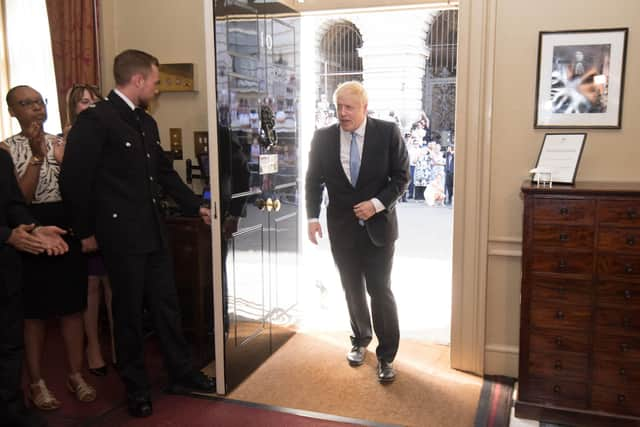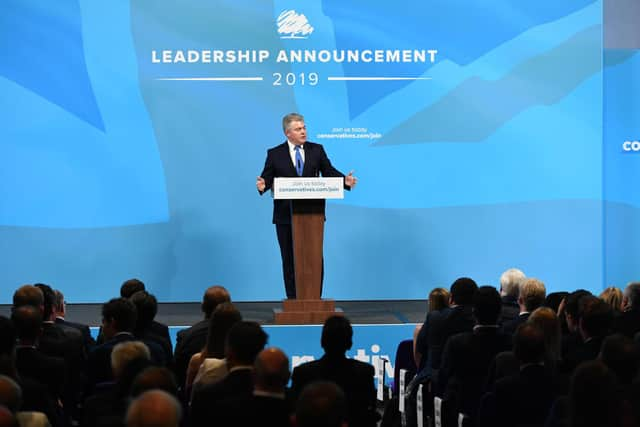Two years on: The highs and lows of Boris Johnson's bumpy premiership and how it has impacted on Scotland
In that time he has got Brexit done, delivered the biggest Tory majority since the 1980s and seen the SNP fail to get a majority in the Holyrood elections.
Add a pandemic and prospect of a second independence referendum to the day-to-day chaos of politics and it’s been anything but a quiet tenure.
Advertisement
Hide AdAdvertisement
Hide AdStarting with the 2019 election, it was about as good a night as Mr Johnson could have dreamed of.


His party elected 365 MPs, put on 47 seats and swept away Labour's red wall.
While this was a startling result, things were less rosy north of the border, with the SNP adding 13 seats to manage a total of 48.
The result sparked, as most things do, Nicola Sturgeon to demand powers for a second independence referendum – a cry the Prime Minister has so far resisted.
Mr Johnson’s handling of the Union has seen him oust the head of the Union Unit days after his spokesman said they were an “important” part of the operation, had his successor quit after two weeks and then folded the operation as a whole to replace it with his own super committee.


Ms Sturgeon’s party winning earlier this year north of the border intensified the calls, but without a majority and the timing of a pandemic, no referendum will be forthcoming.
Figures in rival parties claim Mr Johnson’s leadership has made both the SNP and Tories worse, with one suggesting the Prime Minister had “polluted the basis of liberal democracy with bad faith”.
They added: “Boris being so toxic has been a gift for the SNP and allowed them to turn yet another election into a poisonous binary war between the Tory nationalists and SNP nationalists.”
Advertisement
Hide AdAdvertisement
Hide AdThese things may be true, but this massive weapon in the SNP’s arsenal then saw them yet again not land a majority in Holyrood.
For many, the Prime Minister will never be separated from Brexit – a deal struck against all odds that delivers so well for Britain Mr Johnson is now trying to renegotiate it.
Brexit is the elephant in the room, the stone around the neck of modern politics, the lens through which every conversation on policy and his premiership is framed.
The impact on Scotland has been severe.
Mr Johnson’s Brexit deal hit Scottish fishermen to the tune of about one million pounds a day, and the Scottish seafood industry now finds itself dumping produce it can no longer sell due to delays.
The executive manager of the Scottish Association of Meat Wholesalers, Martin Morgan, says members are sending "maybe two thirds" less to Europe.
Now Mr Johnson is seeking to renegotiate the Northern Ireland Protocol, with all the confidence of a man newly discovering that actions have consequences.
These are not political points, but direct consequences of the Prime Minister’s “oven ready deal”.
Leaving Europe also led to the creation and passing of the Internal Market Bill, something the UK Government believes will allow Westminster to directly fund Scottish businesses and boost infrastructure by reclaiming powers from Brussels.
Advertisement
Hide AdAdvertisement
Hide AdWhile the SNP label the Bill as a power grab, Tory MPs believe the legislation shows a UK Government finally throwing off the “devolve and forget” approach.
Scottish Tory MP Andrew Bowie suggested the UK Government’s approach was more of a long game and insisted Mr Johnson was an “asset” in Scotland.
He said: “Under Boris, the Tory party's unionism has become much more muscular.
“We are demonstrating this in deeds as well as words across the UK.
“Where we find obstruction with the Scottish Government, we are not going to just roll over, but instead take them on and where needed just go directly to local authorities.
“It’s going to take time for authorities to get used to, but when these projects do start delivering people will see that.”
This more hands-on approach is not an isolated gesture, but part of a wider approach to Scotland.
More than 1,000 civil servants are set to relocate to Glasgow and East Kilbride this year, in a bid to "bring key decision makers closer to the communities they serve".
Advertisement
Hide AdAdvertisement
Hide AdThen there is the UK Government’s Union Connectivity Review aimed at improving links between different parts of the UK.
The Scottish Government has tried to avoid engaging with the review and dismissed it as “superficial”, but it still shows efforts from the UK Government to address problems in Scotland.
Then there is the pandemic. Mr Johnson’s premiership has seen huge divergences with Scotland in both messaging and measures.
In March he said the UK could "turn the tide" in 12 weeks, that antibody tests would be a "game changer", that cancelling Christmas would be "inhumane", that "moonshot" testing would fix things by Christmas and that a second lockdown would be a "disaster".
It has led Britain to one of the highest death tolls in Europe.
Mr Johnson’s relentless confidence, even now in unlocking far quicker than Scotland, has helped the First Minister look stronger, despite Scotland having its own share of issues in dealing with the pandemic.
When he tells his MPs behind closed doors that Scotland would have no vaccines without the UK Government, rather than celebrating collaboration, he makes a difficult job even harder.
The vaccine roll-out in the UK has been one of the best in the world, a triumph of both the NHS and government in procurement and delivery.
Advertisement
Hide AdAdvertisement
Hide AdThere are numerous areas where his administration is delivering, but until he lets the results dominate the headlines instead of his gaffes, Mr Johnson will not be a regular visitor to Scotland anytime soon.
If you haven't already, please consider supporting our trusted, fact-checked journalism by taking out a digital subscription.
Comments
Want to join the conversation? Please or to comment on this article.
